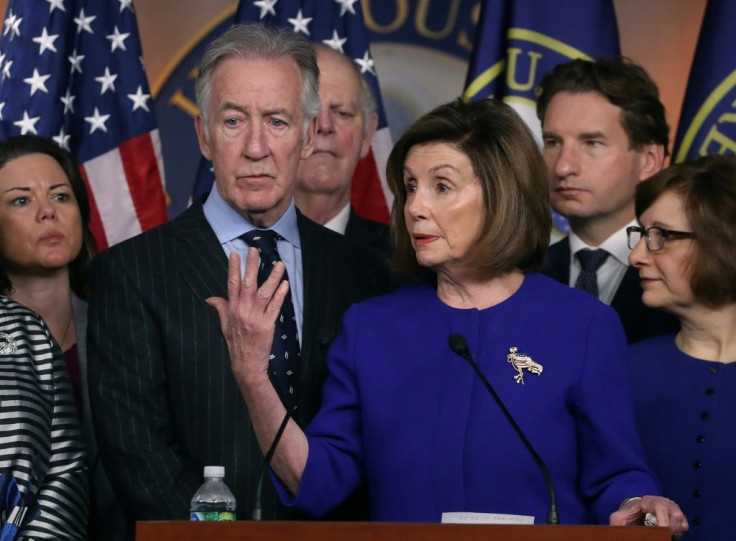US Trade News: Democrats, Trump Administration Agree on Canada - Mexico Deal

On the same day the House filed articles of impeachment against President Donald Trump, Speaker Nancy Pelosi announced Tuesday that Democrats and the White House agreed to the terms of a revised U.S.-Mexico-Canada Agreement.
The new trade pact would replace the old North American Free Trade Agreement, also known as NAFTA
“There is no question of course that this trade agreement is much better than NAFTA,” Pelosi said, adding the pact is “infinitely better than what was initially proposed by the [Trump] administration.”
On Monday night Pelosi said her main focus was on protecting American workers.
“There are those who I read about in one place or another that say, ‘Why would you give President Trump a victory?’” Pelosi said. “Well, why wouldn’t we? This is the right thing to do for our trade situation, for our workers.”
Trump himself praised the revamped trade deal.
“It will be the best and most important trade deal ever made by the USA. Good for everybody -- farmers, manufacturers, energy, unions,” he tweeted.
Vice President Mike Pence said the new trade deal “will create even more jobs for the hardworking families who are the backbone of our economy – the farmers, ranchers, manufacturers, and small business owners.”
Other Republicans also spoke favorably of the agreement.
“This agreement has been the result of painstaking bipartisan negotiations over the past year, and would not have been possible if not for the willingness of President Trump to work patiently with Democrats to get something done that he knew was in the best interests of American workers, farmers and manufacturers,” said Sen. Rob Portman, R-Ohio, a former U.S. trade representative.
The agreement "will be a significant win for farmers, workers and all Americans," said Sen. Chuck Grassley, R.-Iowa. "Renegotiating NAFTA was a central campaign promise made by President Trump. He kept his word and Americans will enjoy the many benefits of this upgraded trade deal as a result."
Pelosi reportedly sought and gained stronger enforcement provisions in the deal from the White House.
“There is no denying that the trade rules in America will now be fairer because of our hard work and perseverance. Working people have created a new standard for future trade negotiations,“ said AFL-CIO President Richard Trumka. “President Trump may have opened this deal. But working people closed it.”
Trumka added: “We demanded a trade deal that benefits workers and fought every single day to negotiate that deal; and now we have secured an agreement that working people can proudly support.”
The support of leading labor figures like Trumka is significant.
"To the extent that Trumka and labor comes out and says that this is an improvement, I think that that will be unifying,” Rep. Steny Hoyer, D-Md., said.
Among other things, the deal will likely move some manufacturing back to the U.S. For instance, the deal carries a provision that requires 40% to 45% of automobiles to be made in countries in which autoworkers receive wages of at least $16 an hour by 2023 – this requirement would exclude Mexico.
The pact also requires that 75% of auto components be manufactured in the U.S., Canada and Mexico (instead of, say, China) to avoid tariffs.
"More than 12 million American jobs depend on our $1.4 trillion trading relationship with Canada and Mexico, and [this trade pact] will strengthen this trade relationship," said Tom Linebarger, CEO of Cummins Inc., an engine manufacturer, and chairman of the Business Roundtable's trade and international committee.
Some agricultural advocates also commended the treaty.
“It will deliver a measure of certainty farmers badly need right now," said Angela Hofmann, co-director of the advocacy group Farmers for Free Trade. "Farmers and ranchers will be watching closely to ensure that their members of Congress are standing up for American agriculture."
Commerce Secretary Wilbur Ross told Fox Business the deal may create more than 176,000 new jobs in the U.S. and contribute $34 billion into the U.S. auto industry. He added the agreement could create as many as 589,000 jobs within five years.
The deal must still be ratified by the U.S., Mexico and Canada.
The Democrat-controlled House could vote on the agreement by Dec. 18.
Mexican Foreign Relations Secretary Marcelo Ebrard said Monday there would be a meeting of trade negotiation officials from the three nations in Mexico City on Tuesday “to announce the advances achieved” on the trade agreement. U.S. Trade Representative Robert Lighthizer will also attend that meeting.
“After working with Republicans, Democrats, and many other stakeholders for the past two years we have created a deal that will benefit American workers, farmer, and ranchers for years to come,” Lighthizer said in a statement.
© Copyright IBTimes 2025. All rights reserved.





















